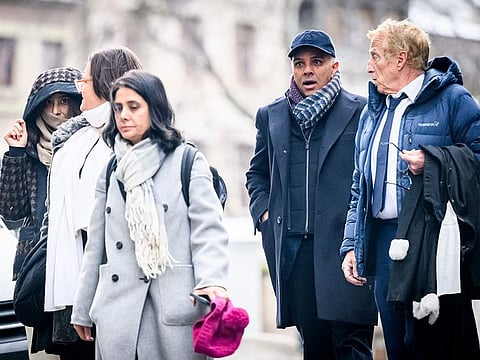UK's richest family, the Hindujas, get jail terms for exploiting staff at Swiss villa
Prakash and Kamal Hinduja receive 4.5 years, while their son Ajay and his wife get 4 years

Geneva: A Swiss court handed jail sentences to four members of Britain's richest family, the Hindujas, on Friday, branding them "selfish" for exploiting Indian staff at their Geneva mansion.
Lawyers for the members of the Swiss-Indian family - who were not present in court - said they would appeal the verdict.
The defendants were acquitted of human trafficking, but convicted on other charges in a stunning verdict for the family, whose fortune is estimated at 37 billion pounds ($47 billion) by the Sunday Times.
Prakash Hinduja, 78, and his wife Kamal Hinduja, 75, each got four years and six months, while their son Ajay, 56, and his wife Namrata, 50, received four-year terms, the presiding judge in Geneva ruled.
They were convicted of "usury" for having taken advantage of their vulnerable immigrant staff to pay them a pittance.
"The employees' inexperience was exploited," judge Sabina Mascotto said in her judgement. "They had little education or none at all and had no knowledge of their rights.
"The defendants' motives were selfish," she said, adding that the Hindujas were motivated "by the desire for gain".
The court acquitted them of the more serious charge of human trafficking, on the grounds that the workers had travelled to Switzerland willingly.
$360 salary
During the trial the family were accused of bringing servants from their native India and confiscating their passports once they got to Switzerland.
Prosecutor Yves Bertossa accused the Hindujas of spending "more on their dog than on their domestic employees".
The family paid the household staff about 325 francs ($363) a month, up to 90 percent less than the going rate, the judge said.
"The four Hinduja defendants knew the weak position their employees were in and knew the law in Switzerland," Mascotto said.
The family denied the allegations, claiming the prosecutors wanted to "do in the Hindujas".
They had reached a confidential out-of-court settlement with the three employees who made the accusations against them, leading them to drop their legal action, said the defence.
Despite this, the prosecution had decided to pursue the case due to the seriousness of the charges.
Following the verdict, Bertossa requested an immediate detention order for Ajay and Namrata Hinduja, claiming a flight risk.
The judged denied it, accepting the defence argument that the family had ties to Switzerland. It noted that Kamal Hinduja was hospitalised in Monaco and the three other family members were at her bedside.
Both the elder Hindujas had been absent since the start of the trial for health reasons.
A statement from the defence lawyers announcing the appeal said they were "appalled and disappointment" at the court's ruling.
But it added: "The family has full faith in the judicial process and remains confident that the truth will prevail."
'Not mistreated slaves'
The defence had argued that the three employees received ample benefits, were not kept in isolation and were free to leave the villa.
"We are not dealing with mistreated slaves," Nicolas Jeandin told the court.
Indeed, the employees "were grateful to the Hindujas for offering them a better life", his fellow lawyer Robert Assael argued.
Representing Ajay Hinduja, lawyer Yael Hayat had slammed the "excessive" indictment, arguing the trial should be a question of "justice, not social justice".
Namrata Hinduja's lawyer Romain Jordan had also pleaded for acquittal, claiming the prosecutors were aiming to make an example of the family.
He argued the prosecution had failed to mention extra payments made to staff on top of their cash salaries.
"No employee was cheated out of his or her salary," Assael added.
With interests in oil and gas, banking and healthcare, the Hinduja Group is present in 38 countries and employs around 200,000 people.
Sign up for the Daily Briefing
Get the latest news and updates straight to your inbox



